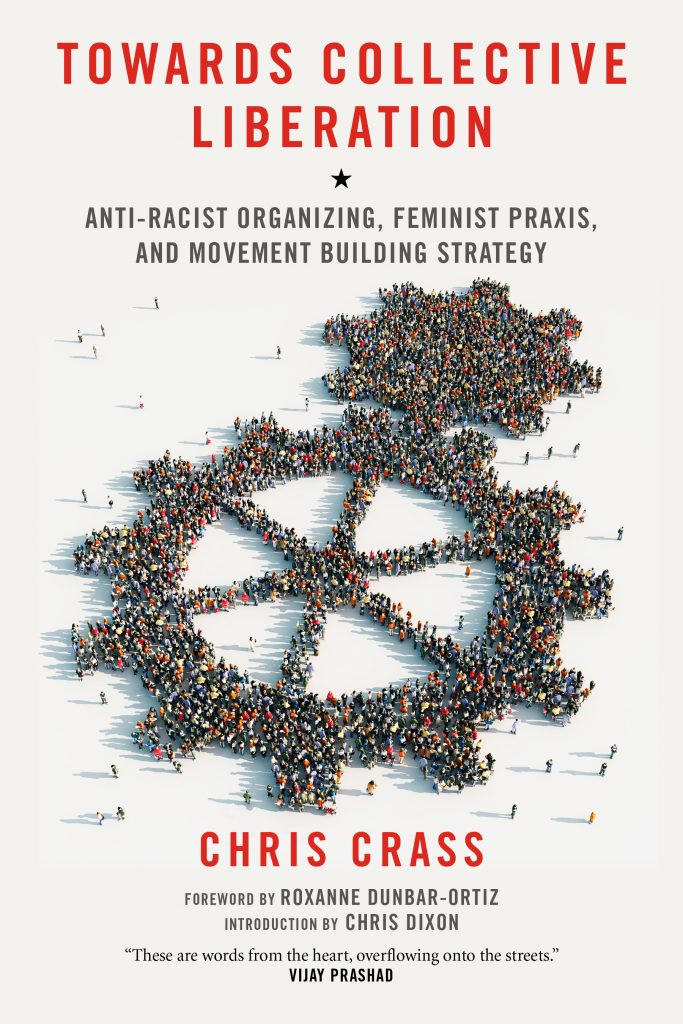
By Laura Campagna
Feministing.com
May 30th, 2013
In his new book, Towards Collective Liberation: Anti-Racist Organizing, Feminist Praxis, and Movement Building Strategy, Chris Crass rightly points out that there are more men influenced by feminism today than at any other time in history. While this may be so, and I believe it is, a book written by a man about his deep commitment to feminism is still radical, and far too rare. Especially because these books are able to speak to readers with gender privilege in a unique and effective way. The good news is with his first book, Crass is able to do just that, and more.
His feminist credentials are immediately established in the foreword by Roxanne Dunbar-Ortiz, who Crass lists as a mentor, but who argues that she has learned as much from him as he has from her. In the introduction, Chris Dixon calls Crass a voice of his generation who has given expression to such fundamental feminist questions: “How can we overcome the interconnected systems of oppression and exploitation that structure our society? How can we struggle towards collective liberation?”
Crass tackles these daunting challenges and offers concrete strategies in “Towards Collective Liberation,” which blends personal stories and lessons learned through decades of activism, with critical race, feminist, and anarchist theory to create a compelling and accessible read for anyone interested in social justice. His work gives an overview of the revolutionary movements and moments he has been apart of over the past twenty years: fighting for Ethnic Studies while attending community college in Orange County, organizing with Food Not Bombs in San Francisco, shutting down the WTO in Seattle, and founding the Bay Area based Catalyst Project to train the next generation of anti-racist white organizers. What makes “Collective Liberation” so important, is that Crass not only describes what he did and why, but how his thinking changed through the process.
When I first encountered Crass in the Bay Area nearly ten years ago, he was a leader in a community of activists that I was just becoming acquainted with. From my vantage point on the outside, he appeared to have it all figured out: highly intelligent, well read, thoughtful, eloquent, and passionately committed. As many young activists have done to those they admire, I looked at Crass and assumed that he had just been born with more information than I had, that comprehension of complicated theories of social justice had come naturally to him. Here was a white man who had unlearned his internalized superiority, and now worked effortlessly in multi-racial alliances. My belief in his inherent superiority, and others like him, was one of the reasons I felt intimidated to get involved in the movement.
One of the lies that capitalism tells us is that everything should be easy, and that if life is difficult then it’s your fault and you’re doing something wrong. “Collective Liberation” directly contradicts that pervasive ideology by outlining the challenges Crass faced in becoming the formidable activist he is today. As he insightfully writes in the chapter, “What I Believe.”
Capitalism
and other systems of oppression are designed to make almost everyone
feel inadequate, isolated, and powerless. The power of these feelings is
that even though many of us experience them, and they are ingrained in
the culture, most of us think we are the only ones who feel this way.
Such feelings remain with us, even as we question these systems of
oppression and work to end them.
This is why, Crass says, he has
found reading the stories of other activists going through similar
challenges so helpful, and why he chooses to share his own story. He
believes that facing awkwardness, contradictions, and vulnerability is a
necessary part of the work. This type of work takes courage, and his
bravery shines through in his writing.
When reflecting on the San Francisco chapter of Food Not Bombs, Crass gives a thorough overview of the group’s development, their political strategies and campaigns, and their struggles to deal effectively with racism and sexism when it manifested in their ranks. In “Going to Places that Scare Me,” Crass describes how his self of self was shaken when his friend and partner confronted him about contributing to the creation of a sexist culture in their group, the United Anarchist Front. Coming to terms with privilege is often a painful experience because it means removing our blinders to suffering. However, we can’t get stuck in the hurt and hard places. Crass quotes Martin Luther King Jr.: “If you can’t fly, run. If you can’t run, walk. If you can’t walk, crawl. But by all means, keep moving.”
Crass seeks to bring his white audiences to consciousness about racism through articulating how white supremacy instills an internalized sense of superiority over people of color. This work is not easy as it requires confronting feelings of fear, guilt and shame. However, Crass believes that everyone is needed to build a powerful and successful movement. He states that his overall goal in writing is “to help turn race, class and gender into catalysts to help us build our progressive Left movement rather then have them continue to divide us.”
There will inevitably be victories and set backs in the struggle to bring about a new society in which everyone has access to “quality housing, healthy food, dynamic education, meaningful work, accessible healthcare, and vibrant communities with infrastructure that serves people of all ages and abilities.” The most important thing, is that we keep moving. Crass does a wonderful job of articulating a new feminist vision of collective liberation, of an irresistible movement for social justice, in which we all come up together.






